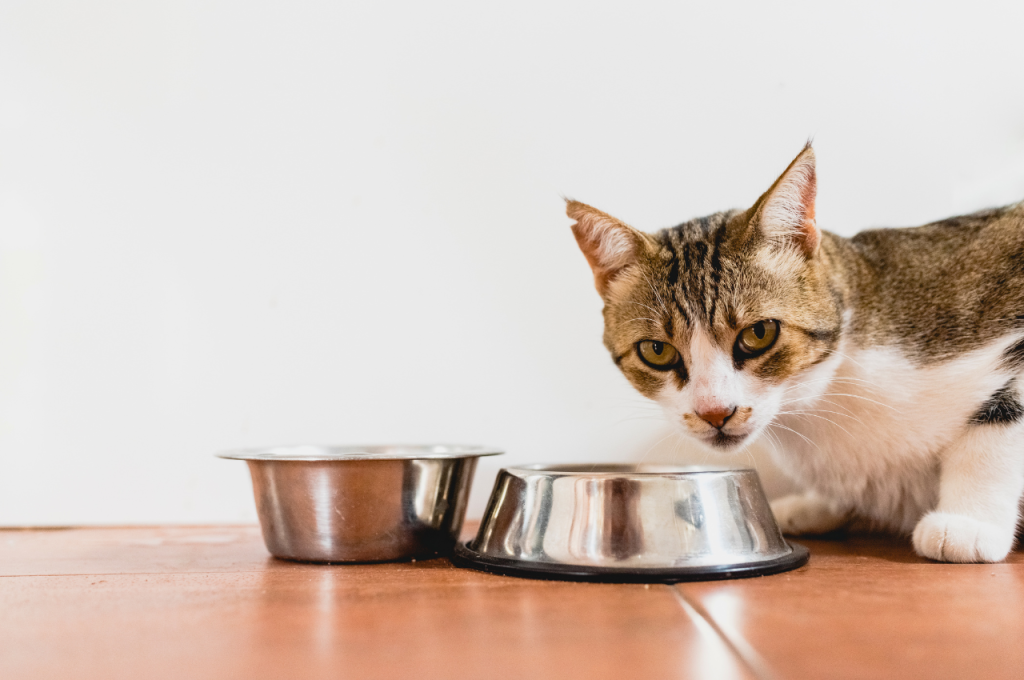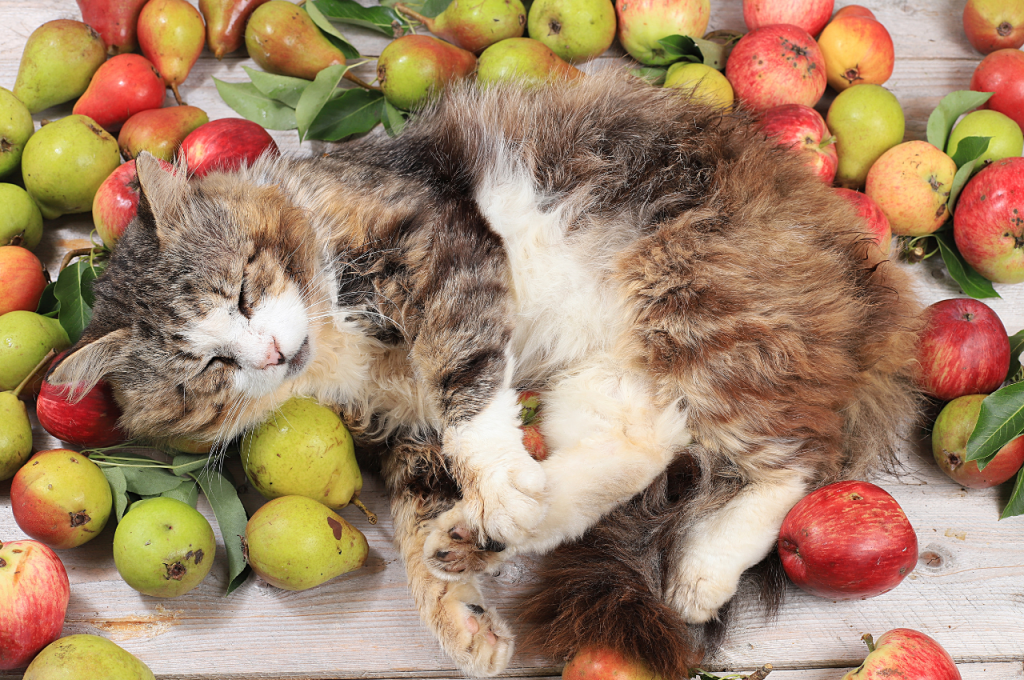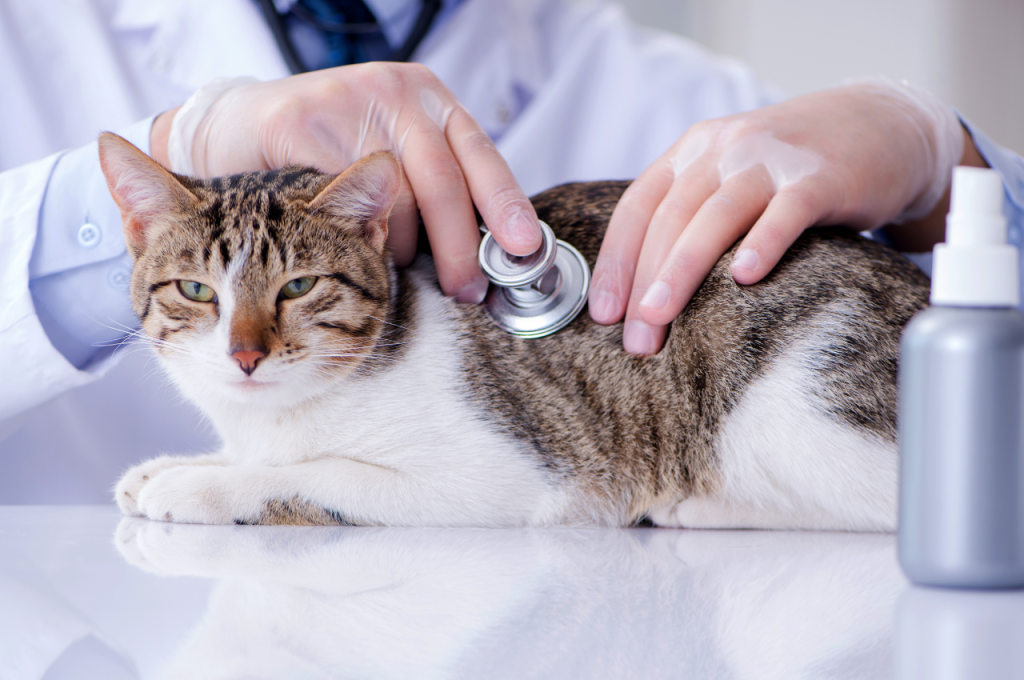Yes, cats can eat certain fruits but only in moderation as treats due to their sugar content. Fruits can provide vitamins and nutrients to supplement a cat’s diet, but not all fruits are safe for them.
It’s important to introduce new fruits slowly and watch for any signs of digestive issues or allergies. Remember, a cat’s primary diet should consist of balanced cat food for optimal health. Providing fruits occasionally can be a fun and healthy addition to their diet, but always consult with a veterinarian before introducing any new foods to your cat’s diet to ensure their safety and well-being.
The Importance of A Cat’s Diet
Cats’ diets play a vital role in their overall health and well-being. Providing a balanced diet that includes high-quality protein sources, essential vitamins, and minerals is crucial for supporting muscle development, immune function, and overall vitality. By prioritizing their dietary requirements, owners can help their cats live longer, healthier lives.

Common Cat Diet
Cats are obligate carnivores, which means meat should be the primary component of their diet. A balanced diet typically consists of high-quality protein sources.
Nutritional Requirements
- Protein: crucial for muscle development and energy.
- Fats: provide essential fatty acids for skin and coat health.
- Carbohydrates: in small amounts for energy and fiber.
- Vitamins and Minerals: aid in various bodily functions.
Consulting with a veterinarian can help determine the right balance of nutrients for your cat’s specific needs.
Cats can enjoy certain fruits in moderation. Always introduce new foods gradually to monitor any digestive issues or allergic reactions.
Fruit Consumption and Cats
Cats and fruits are often a topic of curiosity among pet owners. It’s essential to understand the relationship between fruit consumption and cats to ensure the well-being of your feline companion.
Types of Fruit
When considering types of fruit that cats can eat, it’s crucial to differentiate between safe options like apples and bananas and harmful ones like grapes and raisins.
Effects on Cats
Consuming fruits in moderation can provide various benefits to cats, such as added fiber and essential nutrients. However, some fruits may cause digestive issues or be toxic to cats.
Potential Health Benefits of Fruit for Cats
Fruit can be a delicious and nutritious addition to our feline friends’ diets. While cats are obligate carnivores, meaning they rely on animal-based proteins for their nutritional needs, some fruits can offer potential health benefits when fed in moderation.
Vitamins and Antioxidants
Fruits are rich in various vitamins and antioxidants that can contribute to a cat’s overall health. Vitamin C, found in fruits such as oranges and strawberries, is an essential nutrient that supports the immune system and promotes healing. Antioxidants present in fruits like blueberries can help combat the damaging effects of oxidative stress.
Hydration and Fiber
Fruits can aid in maintaining hydration levels for cats, particularly important for those that may be less inclined to drink sufficient water. Additionally, the fiber content in certain fruits, like apples and pears, can contribute to digestive health and help prevent constipation.
Risks of Feeding Fruit to Cats
Feeding fruit to cats may seem like a harmless treat, but it’s important to be aware of the potential risks it can pose to their health. While cats are obligate carnivores and their main diet should consist of meat, occasional fruit consumption may not have immediate harmful effects. However, there are a few factors that cat owners should consider before incorporating fruits into their pet’s diet. Let’s take a look at the risks associated with feeding fruit to cats.
Digestive Issues
Cats have a sensitive digestive system that is designed to break down and digest animal protein efficiently. While fruits contain natural sugars and fiber, their digestive system may not be equipped to handle these substances in large quantities. Feeding excessive fruit can lead to digestive issues such as bloating, diarrhea, and even an upset stomach. It is crucial to keep the portion size small and monitor your cat’s reaction when introducing fruits into their diet.
Weight and Sugar Concerns
Another risk of feeding fruit to cats is the potential impact on their weight and blood sugar levels. Fruits, although generally considered healthy for humans, can be high in natural sugars. Cats do not require the same amount of carbohydrates as humans, and excess sugar consumption may contribute to weight gain and even diabetes. Additionally, some fruits, such as grapes and raisins, are known to be toxic to cats and can cause kidney failure. It’s crucial to be mindful of the sugar content in the fruits you offer and avoid any known toxic fruits altogether.
Safe Fruits for Cats
Introducing fruits to your cat’s diet can provide them with essential vitamins and minerals, as well as a tasty treat to enjoy. However, it’s important to know which fruits are safe for cats to eat and which should be avoided. In this article, we’ll explore the safe fruits for cats, providing you with recommendations on how to incorporate them into your feline friend’s diet.

When it comes to feeding fruits to your cat, moderation is key. Remember, cats are obligate carnivores, and their primary dietary requirements are sourced from meat. Fruits should only make up a small portion of their overall diet. Too much fruit can lead to digestive issues such as diarrhea or upset stomachs. It’s always best to consult with your veterinarian before introducing any new food to your cat’s diet.
Recommendations
Now that you understand the importance of moderation, let’s explore some safe fruits for cats:
| Fruit | Benefits |
| Bananas | Rich in potassium and vitamins, bananas can be a healthy and tasty snack for your cat. Ensure the banana is ripe and cut it into small, bite-sized pieces. |
| Blueberries | Packed with antioxidants, blueberries can support your cat’s immune system. Offer them as an occasional treat, either fresh or frozen. |
| Watermelon | With high water content, watermelon can help keep your cat hydrated. Remove the seeds and rind, and serve small, seedless pieces. |
- Grapes and raisins
Important: Grapes and raisins can be toxic to cats and should always be avoided.
- Apples
Important: Remove the seeds and core before offering small slices of apple to your cat. Apple sauce can also be a suitable alternative.
- Pears
Important: Remove the seeds and core, and offer small, peeled slices of pear to your cat. Ensure they are ripe and soft.
Moderation
Remember, even with safe fruits, moderation is key. Fruits should only make up approximately 10% of your cat’s daily calorie intake. Keep an eye on your cat’s overall diet to ensure they are receiving the necessary nutrients from their primary food source.
To sum up, when feeding fruits to your cat, stick to safe options, feed in moderation, and always consult with your veterinarian beforehand. By incorporating fruits into your kitty’s diet sensibly, you can provide them with a variety of flavors and nutritional benefits.
Introducing Fruit to Your Cat’s Diet
Introducing fruit to your cat’s diet is a great way to add variety and essential nutrients to their meals. However, it’s important to introduce new foods gradually and monitor your cat for any allergic reactions or digestive issues. Here’s a guide to help you safely incorporate fruit into your cat’s diet.
Gradual Introduction
When introducing fruit to your cat, it’s crucial to do so gradually. Start by offering a small amount of fruit as a treat and observe how your cat reacts. Monitor their behavior and look for any signs of digestive upset or allergic reactions. If your cat tolerates the fruit well, you can gradually increase the portion size over time.
Monitoring for Reactions
It’s essential to monitor your cat closely after introducing a new fruit to their diet. Keep an eye out for symptoms such as vomiting, diarrhea, or changes in behavior. If you notice any negative reactions, discontinue feeding the fruit and consult your veterinarian for guidance. Always prioritize your cat’s well-being when experimenting with new foods.
Alternative Snack Options for Cats
Searching for alternative snack options for cats? Wondering if cats can eat fruit? While some fruits are safe for cats in moderation, it’s important to avoid certain types like grapes and citrus. Consider offering small pieces of safe fruit such as apples or watermelon as an occasional treat for your feline friend.
Cat-safe Treats
Cat-safe treats are essential for your feline friend’s health and enjoyment.
Balanced Nutrition
Balanced nutrition is key to your cat’s well-being, ensuring they get the nutrients they need. When considering fruit as a snack for cats, it’s important to provide variety while adhering to their dietary requirements.
- Fruits safe for cats: Blueberries, apples, and watermelon in moderation.
- Avoid Grapes, raisins, and citrus fruits which can be toxic to cats.
Healthy Alternatives
Opt for healthy alternatives like lean meat, fish, or specialized cat treats to keep your furry friend happy and healthy.
| Healthy Treat Options | Benefits |
| Chicken or turkey | Protein-packed and tasty for cats |
| Fish treats | Rich in omega-3 fatty acids for a shiny coat |
Your cat’s well-being is essential; choose cat-safe snacks wisely for their health and happiness!
Consulting A Veterinarian
It’s always wise to consult with your veterinarian before making significant changes to your cat’s diet. A veterinarian can provide personalized guidance based on your cat’s specific health needs, age, and any underlying medical conditions. They can offer recommendations on suitable fruits for your cat, appropriate portion sizes, and how to safely incorporate them into your cat’s diet.

Professional Guidance
Seeking professional guidance from a veterinarian is essential for understanding whether fruits are safe for your cat.
Individual Health Factors
Cats’ ability to digest fruits can vary due to individual health factors, hence the importance of consulting a vet.
Frequently Asked Questions on Can Cats Eat Fruit?
Sure! Here are some questions about can cats eat fruit:
Q. Can cats eat fruit? Cats Eat Fruit?
Cats can eat certain fruits as occasional treats, but not all fruits are safe for them. It’s important to remember that cats are obligate carnivores, so their diet should primarily consist of meat. Safe fruits for cats include small amounts of apples, bananas, and blueberries, but always remove any seeds or pits, and introduce new foods slowly.
Q. Is it safe for cats to eat grapes?
No, grapes are toxic to cats and should never be fed to them. Grapes and their dried counterparts, raisins, can cause kidney failure in cats, which can be life-threatening. If your cat accidentally ingests grapes or raisins, seek veterinary help immediately.
Q. Can cats eat citrus fruits like oranges?
Citrus fruits like oranges are not recommended for cats. The high acidity of citrus fruits can upset their digestive system and cause stomach upset or even diarrhea. It’s best to avoid feeding cats oranges or any other citrus fruits. Stick to safe fruits like apples or blueberries in small quantities.
Q. Are strawberries safe for cats to eat?
Strawberries are generally safe for cats in small amounts. However, some cats may have allergies or digestive sensitivities to strawberries, so it’s important to monitor their reaction. Always remove the stems and leaves, and cut the strawberries into bite-sized pieces to prevent choking hazards.
Conclusion
In light of the information provided, cats can safely eat certain fruits in moderation. However, it is crucial to be cautious and aware of potential risks associated with feeding fruits to your feline companion.
Always consult with a veterinarian before introducing new foods into your cat’s diet to ensure their health and well-being.
